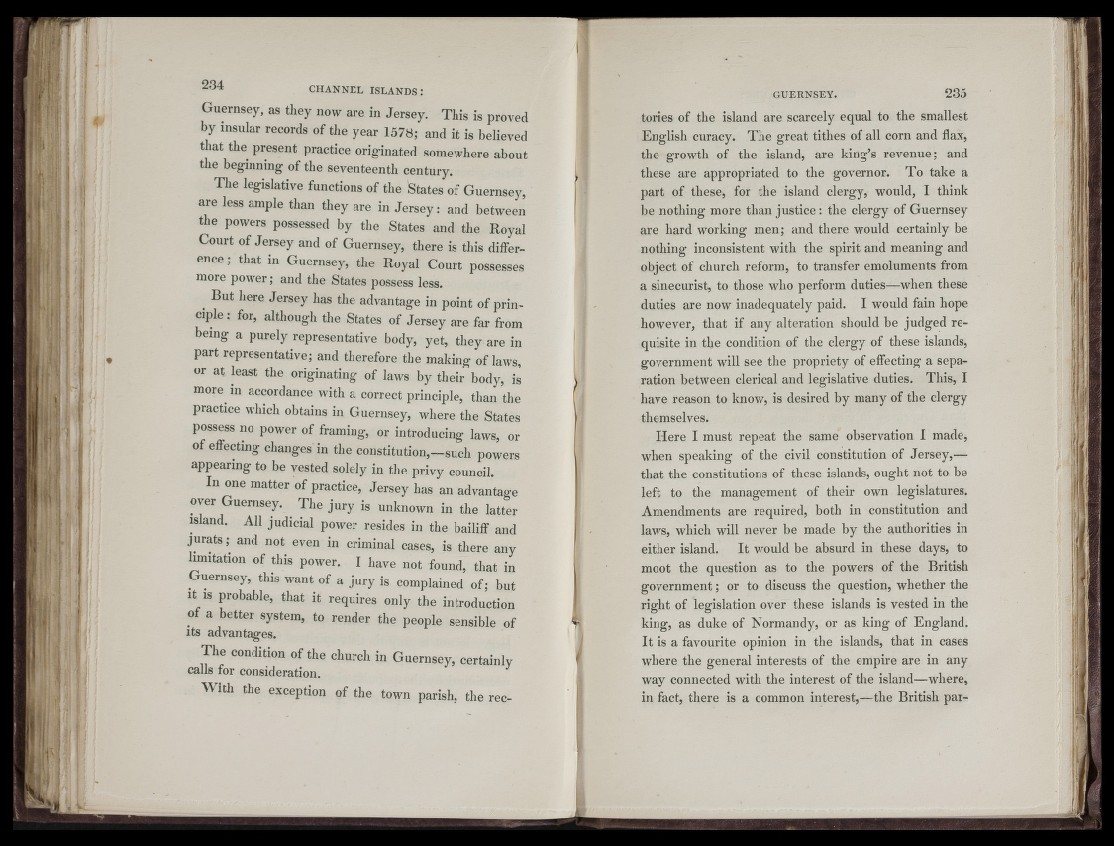
I t
Guernsey, as they now are in Jersey. This is proved
by insular records of the year 1578; and it is believed
that the present practice originated somewhere about
the beginning of the seventeenth century.
The legislative functions of the States of Guernsey
are less ample than they are in Je rsey: and between
the powers possessed by the States and the Royal
Court of Jersey and of Guernsey, there is this difference
; that in Guernsey, the Royal Court possesses
more power; and the States possess less.
^ But here Jersey has the advantage in point of principle
; for, although the States of Jersey are far from
being a purely representative body, yet, they are in
part representative; and therefore the making of laws,
or at least the originating of laws by their body, is
more^ m accordance with a correct principle, than the
practice which obtains in Guernsey, where the States
possess no power of framing, or introducing laws, or
of effecting changes in the constitution,—such powers
appearing to be vested solely in the privy council.
In one matter of practice, Jersey has an advantage
over Guernsey. ^ The jury is unknown in the latter
island. All judicial power resides in the bailiff and
ju ra ts ; and not even in criminal cases, is there any
limitation of this power. I have not found, that in
Guernsey, this want of a jury is complained of; but
It is probable, that it requires only the introduction
of a better system, to render the people sensible of
Its advantages.
The condition of the church in Guernsey, certainly
calls for consideration.
With the exception of the town parish, the rectories
of the island are scarcely equal to the smallest
English curacy. The great tithes of all corn and flax,
the growth of the island, are king’s revenue; and
these are appropriated to the governor. To take a
part of these, for the island clergy, would, I think
be nothing more than justice : the clergy of Guernsey
are hard working men; and there would certainly be
nothing inconsistent with the spirit and meaning and
object of church reform, to transfer emoluments from
a sinecurist, to those who perform duties—when these
duties are now inadequately paid. I would fain hope
however, that if any alteration should be judged requisite
in the condition of the clergy of these islands,
government will see the propriety of effecting a separation
between clerical and legislative duties. This, I
have reason to know, is desired by many of the clergy
themselves.
Here I must repeat the same observation I made,
when speaking of the civil constitution of Jersey,—
that the constitutions of these islands, ought not to be
left to the management of their own legislatures.
Amendments are required, both in constitution and
laws, which will never be made by the authorities in
either island. It would be absurd in these days, to
moot the question as to the powers of the British
government; or to discuss the question, whether the
right of legislation over these islands is vested in the
king, as duke of Normandy, or as king of England.
It is a favourite opinion in the islands, that in cases
where the general interests of the empire are in any
way connected with the interest of the island—where,
in fact, there is a common interest,—the British parm